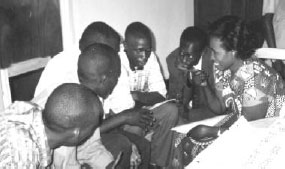
|
|||
|
|
FALL, 2002: Volume 7, Issue 3 An Exciting Possibility After the 1994 genocide in Rwanda, 120,000 people suspected of involvement in the genocide were imprisoned. Eight years later, they remain there. The Rwandan judicial system was destroyed during the genocide and it has not recovered enough to be capable of dealing with the large number of suspects. Consequently after much discussion, the Rwandan Government decided to resurrect the traditional village court system called “gacaca” in Kiyarwandan (the language of Rwanda). Of course, these courts had to be modified from adjudicating minor cases, such as boundary disputes, into cases which determine the guilt and fair punishment for those who participated in the genocide–the intent here is not to deal with the leaders of the genocide, but those who played only minor parts. Each gacaca court has nineteen members and are elected by the members of the community. There are 9,000 gacaca courts at the lowest level and 1500 courts on the higher level! Therefore the average court might try around 10 cases. This is a bold experiment in trying to put Humpty- Dumpty back together again so that peaceful coexistence is possible between the perpetrators of the genocide and their families, the survivors of the genocide, and the many bystanders who lives were disrupted by the genocide and its aftermath. Revenge, intimidation, hostility, anger, and hurt must all be dealt with in a way that heals the society.
The African Great Lakes Initiative (AGLI) had already trained fifteen Alternatives to Violence Project (AVP) facilitators in Rwanda. The Quakers in Rwanda were very concerned about the fact that many of those imprisoned for eight years would return to society, perhaps still with violent, anti-social thoughts and behaviors. Consequently AGLI and AVP-Rwanda had developed a proposal to hold five basic AVP workshops with the soon-to-be-released prisoners, an evaluation, and then 24 more workshops in Kigali, Kigali Rurale, Ruhengeri, and Kibungo. AVP-Rwanda is awaiting sufficient funding ($20,971) and Governmental approval to begin. On July 16, an AFSC delegation to Africa, including myself, met with Aloysie Cyanzayire, the head of the Supreme Court’s Gacaca Department, who would be implementing these 10,500 courts. She described the Gacaca system to us and Mary Ellen McNish of the AFSC described the work of the AFSC around the world. I suggested that David Bucura, General Secretary of Rwanda Yearly Meeting and the AVPRwanda coordinator, report what the AVP facilitators were planning with the prisoners. He spoke for about five minutes in Kiyarwanda–but I did hear the words “Transforming Power” being used. Mme. Cyanzayire’s immediate reaction was that AVP should be holding workshops for the gacacas. So AVP would be working with the judges in addition to the suspects! What an exciting possibility! She asked David Bucura to return the next day to talk more about the possibilities. But by the next day, a person on the gacaca staff was visiting David. Imagine doing 10,500 AVP basic workshops. Then imagine putting a country back together with justice and reconciliation. I discussed the possibilities with David and other AVP facilitators and we recommended that we start with 3 basic workshops for the gacaca department staff and then 25 workshops in the same four areas we planned to do with the prisoners. We thought we would start by taking 3 or so members of 6 gacaca in order to do one AVP workshop with 20 participants. But clearly some of these people would ask AVP to hold workshops for their whole 19 member gacaca. In our discussions, it became clear that fifteen facilitators were not near enough for even the beginning programs we envisioned and that we would have to train their best facilitators more so that they could adequately lead advanced and training for facilitator workshops and mentor apprentice facilitators. Therefore we would need another international team to come for four weeks to do two advanced and two training for facilitator workshops. Then if AVP was going to expand in Rwanda as we envisioned, the Basic AVP manual would have to be translated into Kinyarwandan. David Bucura proposed that three of the facilitators who knew English well would translate the relevant parts of the manual and then all the facilitators would review the work to look for weak areas of translation. This all implies a budget of approximately $60,000 to launch this exciting AVP program. Please pray with AGLI and AVP-Rwanda that we can seek and find sufficient funding for this opportunity. |
||
